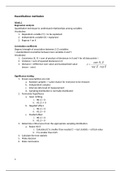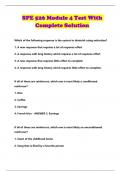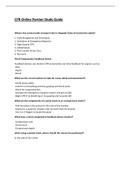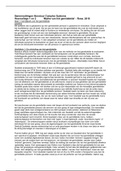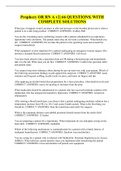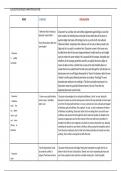Notes Leadership 24/11: Justice and morality
Channel factors: Cooperation versus defection
Businesses and organizations have an interdependent reward structure because
people’s outcomes depend on the actions and decisions of others
- Public goods game (social dilemma)
- Decision to share or withhold resources (information/effort/money)
Interdependent reward: what you get out of something, not directly related to what it delivers you
Most of achievements not individual achievements, but to which many people contribute
- experiment: people need to make a choice, cooperate or not
- prisoner dilemma game: 2 people are suspected of committing a crime together, but police
don’t have evidence, placed in different groups, can’t talk about strategy
- will the commit crime?
- option to admit or that they didn’t commit it
- you don’t know what the other person will say
- work together and admit: you can get less years in prison, if you deny and the other person
says you did it, evidence you are withholding them, you get more, 10 years, other 1 year
- so both admit, 5 years each, so less than 10 years
- C = admit, D = deny
- (problem if you admit, other not) (both didn’t do it, send free)
1
, Other experiment: they changed some content in information provided
- participants: rules game explained as well as reward-structure
- they can invest their money and create value together or freeride and benefit from investments
of others (cooperate or defect)
- black versus grey: experimenter asked to provide contact info of their close friends, then
asked close friends after explaining what game friend is playing: what do you think your friend
will do
some identified by close friends: defecting or cooperate
- some participants played community, others Wall Street games
- name shouldn’t matter, but result: name of game changed cooperate or not
community game more cooperation, even though reward-structure was the same
- why? if your friends identified as … did not explain any variance
- no difference if the participants were seen as defectors or co-operators ahead of the game, no
significant difference
- but what did matter was the name of the game
SO what drives what people do, is what others do
- community game: they believe others are in it to cocreate value with them, trust that others will
cooperate, not the fear if I cooperate, I will be the sucker
- Wall street game: different identity in you triggered, I can lose, this is competition, not
cocreating, game is to see who is the best in the end, so less trust, so not much value creation
- channel factor: it psychologically orients what you decide, in a direction, maybe something you
wouldn’t normally do (it is some kind of nudge)
- 2 identities are in us, context triggers to large extent what we will do
Link to leadership: important task for leaders
- if they want people to follow their rules, their responsibility to create community, trusting
environment
2
Channel factors: Cooperation versus defection
Businesses and organizations have an interdependent reward structure because
people’s outcomes depend on the actions and decisions of others
- Public goods game (social dilemma)
- Decision to share or withhold resources (information/effort/money)
Interdependent reward: what you get out of something, not directly related to what it delivers you
Most of achievements not individual achievements, but to which many people contribute
- experiment: people need to make a choice, cooperate or not
- prisoner dilemma game: 2 people are suspected of committing a crime together, but police
don’t have evidence, placed in different groups, can’t talk about strategy
- will the commit crime?
- option to admit or that they didn’t commit it
- you don’t know what the other person will say
- work together and admit: you can get less years in prison, if you deny and the other person
says you did it, evidence you are withholding them, you get more, 10 years, other 1 year
- so both admit, 5 years each, so less than 10 years
- C = admit, D = deny
- (problem if you admit, other not) (both didn’t do it, send free)
1
, Other experiment: they changed some content in information provided
- participants: rules game explained as well as reward-structure
- they can invest their money and create value together or freeride and benefit from investments
of others (cooperate or defect)
- black versus grey: experimenter asked to provide contact info of their close friends, then
asked close friends after explaining what game friend is playing: what do you think your friend
will do
some identified by close friends: defecting or cooperate
- some participants played community, others Wall Street games
- name shouldn’t matter, but result: name of game changed cooperate or not
community game more cooperation, even though reward-structure was the same
- why? if your friends identified as … did not explain any variance
- no difference if the participants were seen as defectors or co-operators ahead of the game, no
significant difference
- but what did matter was the name of the game
SO what drives what people do, is what others do
- community game: they believe others are in it to cocreate value with them, trust that others will
cooperate, not the fear if I cooperate, I will be the sucker
- Wall street game: different identity in you triggered, I can lose, this is competition, not
cocreating, game is to see who is the best in the end, so less trust, so not much value creation
- channel factor: it psychologically orients what you decide, in a direction, maybe something you
wouldn’t normally do (it is some kind of nudge)
- 2 identities are in us, context triggers to large extent what we will do
Link to leadership: important task for leaders
- if they want people to follow their rules, their responsibility to create community, trusting
environment
2


